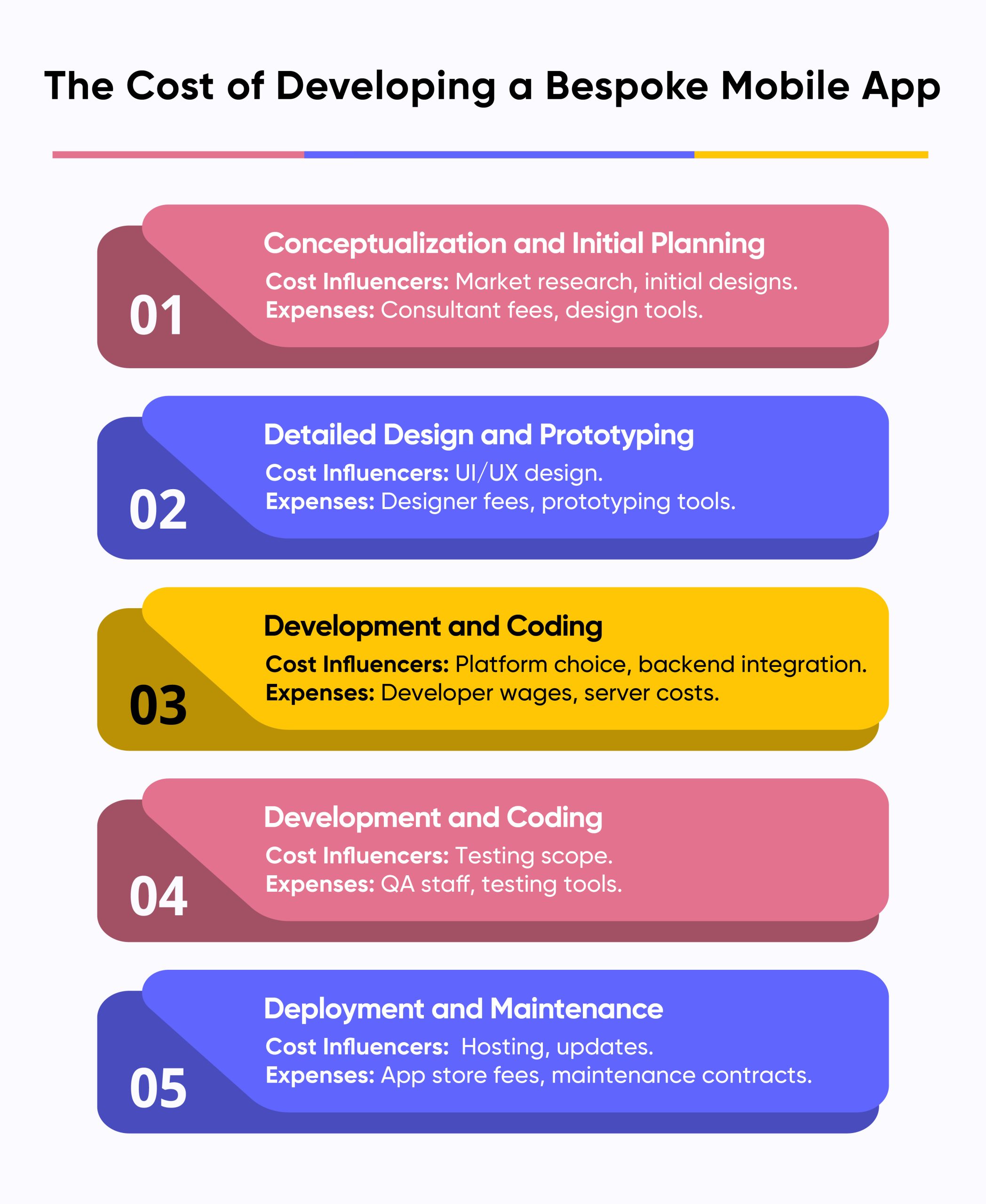Let's Get You Started

Let's Get You Started




You’ve landed in the right place if you want to bring your unique app idea to life or enhance your business processes with a tailor-made solution. This Appxide guide to bespoke mobile apps development will explore its benefits, methods, and critical considerations.
The debate between generic solutions and bespoke application development regarding mobile applications is ongoing. But why choose a custom approach? Here’s why:
Developing a bespoke mobile app is like going on a creative path. Here’s what the roadmap generally looks like:

As the tech market continually grows, staying relevant is a must. Bespoke mobile app development allows businesses to deploy solutions that are not only effective but also innovative. By opting for a custom app, you’re not just following trends but setting them.
| Feature | Bespoke Mobile App | Off-The-Shelf App |
| Customization | High customization to fit specific needs | Limited customization |
| Cost | Higher initial investment but tailored | Lower initial cost but may have recurring |
| Scalability | Designed to scale with your business | May not scale well |
| Integration | Seamless integration with existing systems | Often challenging to integrate |
| Unique Features | Possible to include unique functionalities | Common features that are widely used |
Before jumping into bespoke apps development, here are some critical factors to consider:
Selecting a development partner is as crucial as the app idea itself. Look for a popular app development company that:
Once your bespoke mobile app is live, the process doesn’t end. Instead, it increases. Entering the post-launch phase, analytics and optimization become crucial for sustaining engagement and maximizing the app’s potential. This stage involves learning from fundamental user interactions and fine-tuning your app based on data-driven insights. Here’s how you can effectively navigate this phase:
Start by integrating robust analytics tools within your app. Tools like Google Analytics for Mobile, Firebase, or Mixpanel offer comprehensive features that track user behaviors, app performance, and engagement metrics. These tools help you monitor:
Setting up these tools during the initial development phase ensures you start gathering valuable data from day one.
User reviews and feedback are gold mines for improvement. Regularly monitor feedback across app stores and social media platforms to gauge user sentiment. Look for common themes in user complaints and suggestions to prioritize updates. Consider using in-app surveys or feedback forms to gather more structured insights.
To optimize user experience and engagement, employ A/B testing for different elements of your app. Test variations in your user interface, features, or even marketing campaigns to determine what works best for your audience. A/B testing can help refine the following:
Plan regular app updates based on insights gained from analytics and user feedback. These updates may fix bugs, introduce new features, or improve existing ones. Consistent updates keep your app relevant and signal to users that you are committed to enhancing their experience.
Monitor your app’s performance metrics closely. Look for any signs of crashes, slow loading times, or other issues that could hurt user experience. Tools like New Relic or AppDynamics can help identify performance bottlenecks and guide technical improvements.
While not directly part of app functionality, search engine optimization (SEO) and app store optimization (ASO) are crucial for making your app more discoverable, incorporating keywords, maintaining a strong presence in search results, and optimizing your app’s description and updates to improve visibility and attract new users.
Bespoke mobile apps development offers businesses a tailored and effective way to align digital solutions with their specific goals and user needs. From choosing custom development over standard solutions through careful planning, design, and deployment to utilizing post-launch analytics for improvements, bespoke apps provide significant strategic benefits. Success in this field requires a great idea, a strategic approach, careful execution, and ongoing support to adapt and succeed in a dynamic digital landscape. Remember, every step in developing a bespoke app is an opportunity to refine your vision and deepen user engagement.
A 1: The development time can vary based on the app's complexity and the team's efficiency, typically ranging from a few months to over a year.
A 2: Costs can vary significantly depending on app features and design complexity, from $10,000 to $500,000.
A 3: Consider signing a non-disclosure agreement (NDA) with your development partner to keep your idea secure.
A 4: Absolutely! One of the benefits of bespoke development is the ease of making updates and changes based on user feedback and evolving business needs.
A 5: Work with your development team to implement a robust launch strategy, including app store optimization, social media marketing, and other promotional techniques.

Welcome to Appxide, where innovation meets utility in the world of app development. Our mission is to craft cutting-edge digital solutions that simplify lives and spark connections. With a diverse portfolio that traverses multiple sectors, we are committed to excellence and user-centric design. Stay tuned to our blog for the latest in tech, insights, and the stories behind our projects. Dive into the future with us – where every app we create is a step towards the extraordinary.